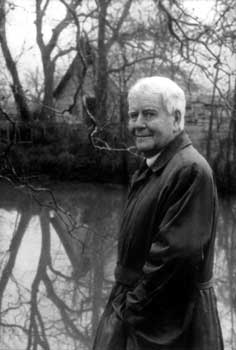

The solicitors' offices were in the South Mall, heralded by a shiny brass plate among many similar ones, all of them drawing attention to the services of legal or medical practitioners. Mr. O'Brien was long since dead, but Mr. Lanigan's presence made up for the loss. He was a person of pyramidal shape, a small head sloping into the slope of his shoulders, arms sloping again as he spread them over his desk. A chalk-striped brown suit imposed a secondary shape of its own, with a heavy watch-chain slung across a waistcoat so tightly fastened over the slope of Mr. Lanigan's stomach that it appeared to be perpetually on the point of bouncing a dozen tiny buttons, were almost lost in the smooth inclines of his face, and artificial chins, created by a stern cellulid collar, all but obscured the flamboyance of a polka-dotted brown bow-tie. Mr. Lanigan's smile perpetually twinkled.
Is that not a stupendous description? William Trevor never turns his "secondary" characters into set dressing. If they have a place in the story they always get their fair due.
In Fools of Fortune a family is gutted by a fire resulting from the war in Ireland, I won't ruin your own reading experience with more details than that. The son, still a young boy, observes how his mother changes as she becomes obsessed with the man she holds responsible for the violent act.
My mother frowned and shook her head, appearing to dismiss the subject. She said that when she was first married she used to wait at the mill every afternoon so that she and my father could walk back together to the house. 'I remember the day you were born, Willie. I remember the broken veins in Dr. Hogan's face and how his shiny boots reminded me of a hunstman. "Now, now Mrs Quinton," he said, "make your effort when I tell you."'
She poured herself more whiskey. She told me I had been creased and red, my eyes squeezed tight. And then, abruptly, she exclaimed, interrupting what she was saying:
'It's that man who's on my mind. You know how that kind of thing is, Willie? Suddenly, when you're not thinking at all it comes to you. That horrible Sergeant Rudkin, Willie.'
She went on talking about him, asking me if I could visualize him in his vegetable shop in Liverpool, selling produce to people who didn't know he had been responsible for a massacre. Would they have eaten the parsnips and cabbages if they knew? Would they have laughed and joked with him if they knew he had ordered the shooting of the dogs? She described his vegetable shop to me so minutely that she might have visited it herself, potatoes in sacks, tinned fruit on a shelf, bananas hanging from hooks.
'The Devil incarnate,' my mother said.
I find that a devastating few paragraphs. The way the mother becomes hollowed out by loss. Life moves from the present, pre-fire, to the past in an instant. I am realizing that this book reminds me of the plays of Horton Foote, but particularly his The Habitation of Dragons so redolent is it of a single moment of tragedy in a family's life. Foote writes in an unfancy American idiom of the dramas that buffet ordinary folk in early 20th century small town Texas, rather than Ireland. His words aren't inherently dramatic, they just contain the simple moments of lives unadorned, but moment builds upon moment until his characters are moved on a mammoth current of action that, in the case of Habitation of Dragons, is heart-rending. Foote is best known for the screenplays of Tender Mercies, To Kill a Mockingbird, and The Trip to Bountiful. He has written for the American theater from its heyday in the 1950s and is, I believe, still writing. I have directed and acted in a couple of his plays. I consider them required reading - I cannot recommend The Habitation of Dragons enough. Trevor and Foote - two observers who gently dip their cups into deep wells.
















No comments:
Post a Comment